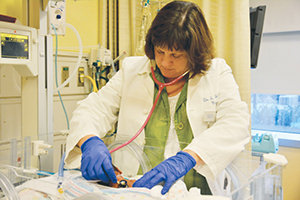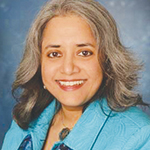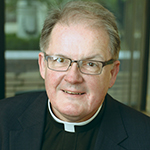By LISA EISENHAUER
Even before the Association of American Medical Colleges officially launched its Center for Health Justice this fall, the staff of the nascent center was at work on an initiative focused on trust building through community engagement.
Over the summer, the center's team led virtual workshops built around 10 "Principles of Trustworthiness." The center says the principles, along with accompanying videos and tool kit, "were co-developed by community stakeholders as a guiding compass for organizations from any sector to demonstrate trustworthiness to their communities."

Alberti
Philip M. Alberti, senior director of health equity research and policy with the Association of American Medical Colleges, is founding director of the Center for Health Justice. He says that the association started its work around trust a few years ago when engagement with underserved communities showed fault lines between them and the health care sector.
People within those communities pointed to various reasons for the disconnect, including historic wrongs such as the syphilis experiments done in Tuskegee, Alabama, that left Black men to die of a curable disease. Those communities also pointed toward insensitivity that they and others have experienced related to cultural traditions and practices.

In a photo taken before the pandemic, Dr. Susan J. Dulkerian, chair of the department of pediatrics, attends to an infant in the neonatal intensive care unit at Mercy Medical Center in Baltimore. Mercy traces its roots in downtown Baltimore to the 1870s. It delivers the most babies of any Baltimore hospital.
Alberti says the issue of lack of trust in mainstream medicine by medically underserved populations gained a stronger sense of urgency as the COVID-19 pandemic began taking a disproportionate toll on minority communities and as outrage grew about the deaths of Black Americans at the hands of police.
"We didn't even have to look historically. We watched inequities develop in real time over the last 18 months," he says. "It's not just about Tuskegee. This is about modern-day experience of inequity creation before our very eyes."
Elevating trust
The Center for Health Justice isn't the only health care-related group that has zeroed in on the issue of trust this year. In May, the American Board of Internal Medicine Foundation began its Building Trust initiative.
Dr. Richard Baron, president and chief executive of the American Board of Internal Medicine and its foundation, says in an interview with MedPage Today that his organization's effort was prompted in part by a "major politicization of knowledge" around things like the safety of COVID vaccines and the usefulness of masking.
"We really are living in a world in which facts themselves — the whole existence of facts — is in dispute," Baron says in the interview.
The foundation describes its trust initiative as a "multifaceted effort to increase conversation, thought leadership, research and best practices to elevate trust as an essential organizing principle for improving health care."
The initiative includes a collection of resources, a series of webinars and the awarding of grants for work that creates "a more trustworthy health system that serves everyone." Among the early collaborators in the initiative are SSM Health and Virginia Mason Medical Center, part of
CommonSpirit Health.
Diversity of thought
Yolonda Wilson, an associate professor at the Albert Gnaegi Center for Health Care Ethics at Saint Louis University, says whether such initiatives can succeed at breaking down barriers between communities and health care providers likely depends on whether those communities are part of the process from the get-go.

Wilson
"What I don't think you can do is have a one-size-fits-all approach to just anybody who you think doesn't trust the health care system," she says.
Communities and individuals have motivations and justifications for their behavior, including historical or current injustices and cultural differences, Wilson says, and those factors need to be taken seriously and addressed by health care providers. "I think it's worth digging in and exploring what exactly is happening and figuring out whether trust is even the right way to describe what's happening," she adds.

Hibner
In a recent discussion, Wilson and Nathaniel Blanton Hibner, director of ethics for CHA, agreed that the burden of building trust should not fall on individuals or communities. "It's not that we need to change their behavior towards us alone," Hibner explains. "We need to change medical behavior towards those communities."
Flipping the narrative
Wilson and Hibner also agree that the key to establishing a trusting relationship is not just talking about what needs to be done, but following through. The question to be asked, Hibner says, is: "Are we actually doing it —I'm not saying are we getting the results that we necessarily are hoping for —but are we actually walking the walk?"
One of the Center for Health Justice's 10 Principles of Trustworthiness — Without action, your organizational pledge is only performance — specifically calls on organizations to "walk the walk" by deploying resources, coordinating the work of building trust across their workforce and recognizing that trust building is not a one-person job.
In Alberti's view, one of the distinguishing aspects of the Center for Health Justice's initiative is that its flips what he calls a popular narrative, that is, that institutions need to figure out how to convince communities or populations to trust them.
"We thought it was important to change that paradigm and say, it's not about building trust or convincing folks to trust, it's really about showing that we are worthy of trust," he explains.
Alberti says the Center for Health Justice is basing its overall work on a few pillars. One is that community engagement is key to ensuring that its efforts are grounded in "the wisdom of communities." Another is that collaborations must reach beyond the health care sector so that factors that affect health outcomes and life spans such as education and food access are taken into account. One more pillar is advocating for policy development and policy changes that address injustices and inequities.
Integrating teachings
Mina Kini hopes to integrate the center's teachings and its trustworthiness principles into her work as system director, diversity and inclusion at SSM Health. She attended one of the center's virtual workshops over the summer.

Kini
Kini says SSM Health recognizes the importance of having trusting relationships with its patients and communities. "Without addressing trust of communities, we will never be able to solve disparities," she says.
SSM Health already is working to develop and expand programs and policies to improve relationships with communities that are often slighted by the health care sector. She points to its support for CHA's We Are Called initiative to promote racial justice and address disparities. She also cites a partnership the health system has with organizations in Missouri and Wisconsin to provide job opportunities to people who have disabilities that often keep them out of the workforce.
"It's not only being aware of those principles of trust but living the behaviors that is an underpinning to all these principles," she says. "There are strategies and behaviors that need to occur for this to be realized."
Sustained credibility
Fr. Tom Malia, assistant to the president for mission at Mercy Medical Center in Baltimore, believes trust is inherent to the work of the Catholic health ministry.

Fr. Malia
He says trust is best fostered through commitment and service, as his hospital has demonstrated by staying put in the heart of a city that has seen racial, economic and other challenges over the last several decades and serving the community living there.
Fr. Malia believes trust between Mercy Medical Center and its community is manifest in many ways. Among them is the hospital's growth in his 19 years there — to 5,278 from 2,000 employees. It operates care sites and affiliated offices across the Baltimore region. It's a measure of trust that Mercy delivers more babies than any other hospital in the city, he says.
And, Mercy has collaborated with other organizations to address social issues that impact health status and well-being. For example, Fr. Malia notes that hospital executives were involved in the creation of Health Care for the Homeless, an organization founded in the 1980s that provides medical and support services for the unsheltered including assistance in securing housing and public benefits.
When it comes to trust, he says Mercy's is built on unwavering support for and connections to its community. Says Fr. Malia: "The credibility is still here. It's always been here."
Association of American Medical Colleges Principles of Trustworthiness
- The community is already educated; that's why it doesn't trust you.
- You are not the only experts.
- Without action, your organizational pledge is only performance.
- An office of community engagement is insufficient.
- It doesn't start or end with a community advisory board.
- Diversity is more than skin deep.
- There's more than one gay bar, one "Black church," and one bodega in your community.
- Show your work.
- If you're gonna do it, take your time, do it right.
- The project may be over, but the work is not.